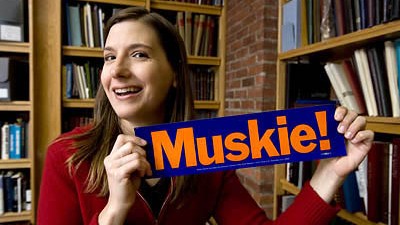Ask Me Another
It’s all about the paper trail for archives director Kat Stefko
Director of Muskie Archives and Special Collection Library Kat Stefko.
Asked to describe her job as an archivist, Katherine Stefko’s stock reply is, “I’m paid to read other people’s mail.” The joke is revealing. Director of archives and special collections at Bates, Stefko oversees the delicate work of gathering documentary materials that reveal the details — sometimes very personal — of history.
The Muskie Archives houses nationally significant holdings relating to the late Ed Muskie ’36. You’ve called him the hero of the 1968 presidential campaign, running with Hubert Humphrey.
It was the first time a presidential candidate advertised himself as having chosen a VP who could step up and be president. There was this fabulous political ad that Humphrey put out with the image and sound of an electrocardiogram and the line, “Who is your choice to be a heartbeat away from the presidency?”
We have film showing Muskie inviting a heckler to the stage. Muskie basically said to him, “I’ll give you 10 minutes to tell people your ideas, but in exchange your group has to be quiet and listen to my ideas.” He was extraordinarily genuine in wanting to understand everyone’s opinions before formulating a policy.
By extending that respect, he really gained a lot of ground with the antiwar protesters. Many political observers speculate that had the election been even a week or two later, Humphrey and Muskie would have come from behind to win.
You recently had vice-presidential scholar Joel Goldstein at the archives researching a book.
By necessity, archivists have to be generalists, so having somebody there with dedicated time to read through and make connections within the Muskie Papers has been incredible.
He has become a huge fan of Muskie, and wrote a lot of op-eds during this election year drawing parallels between the ’68 and 2008 campaigns. Goldstein has been particularly impressed by Muskie’s ability to inspire and sustain civil discourse.
| Muskie AwardBates’ Muskie Oral History Project recently won the Elizabeth B. Mason Major Project Award, from the Oral History Association, for excellence in an oral history project. The Muskie project comprises some 400 interviews. |
You have a broad collecting mandate, between representing Muskie and other Bates people, and then officially documenting the College’s history.
We collect externally and internally — that’s important to realize. External to Bates, that’s usually me. I spend quite a bit of time working with alumni, their families, and other donors.
It’s always better if you talk to a person about their papers, because nobody can tell a story like the person who lived it. Also, giving one’s papers to an archives is not necessarily an easy thing to do — “Here’s my mail, make it publicly available.”
I talk to people about the historical importance of their materials. And I try to foster confidence so they understand that as an archivist, I’m ethically motivated to do the right thing, balancing the privacy needs of our donors with the research interest of our patrons.
What’s the on-campus process?
Internally, Pat Webber, the College archivist, works with people on campus to make sure that their records of historical value are preserved in the archives. We are authorized to collect from College offices, but there are other records being created at Bates with permanent value. So he goes to student-organization meetings in the evening to talk about the importance of their records.
The Outing Club, for instance, is celebrating its 90th anniversary in 2010, so they and their adviser, Judy Marden, have been thoughtful, with Pat’s encouragement, about their records. Last summer we received all their historic records.
How else do you interact with alums?
We get quite a few casual visits during Reunion and Homecoming Weekend. We’ve offered a historic film festival where we’ve shown old films from the collection, and those have been quite popular.
Whenever possible we try to instill in alumni that we really want material that tells the personal side, the unofficial version of Bates’ history — scrapbooks, letters home to Mom and Dad expressing what it was like to adjust to college in Lewiston. These are the types of materials that support cultural and social history, and they can make the past seem real to today’s students.
Who laid the groundwork for the collections of College records?
Harry Rowe ’12, who worked at the College for about half a century, was the unofficial College historian. Bursar Norm Ross ’22 was a diligent record keeper. And he passed the baton to Bernie Carpenter as treasurer. They did a great deal to make sure that early records survived. We’re extraordinarily lucky to have as extensive a historical record as we do.
How is technology changing what you do?
The speed of obsolescence creates monetary challenges. Where a piece of paper, even a black and white photograph, can live happily on a shelf for 500 years, an 8-inch floppy drive is already obsolete.
We’re constantly thinking about getting things into a stable format — by today’s standards — and then developing a strategy to deal with it when that format becomes obsolete.
And something I’ve been thinking about is that kids don’t keep diaries anymore — they keep blogs. How can we thoughtfully collect and preserve blogs? I don’t have an answer yet, but I know it’s something that we need to do.
